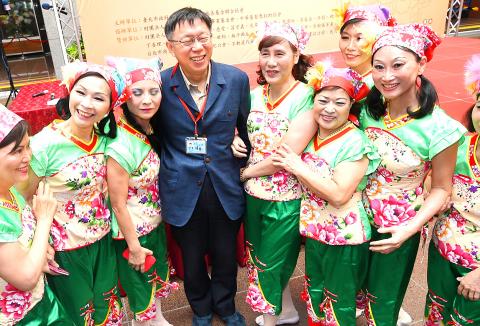The nation’s large number of unmarried men and women is a national security crisis, Taipei Mayor Ko Wen-je (柯文哲) said yesterday, clarifying previous comments which appeared to assert that only unmarried women were a problem.
“Marriage generally occurs very late,” Ko said, citing statistics from the Taipei City Government’s Department of Civil Affairs that show 59 percent of men and 50 percent of woman between 30 and 34 years of age have never been married.
“Marriage has already become a national problem because if these people remain unmarried, when they grow older they will become a major burden on social services,” he said.

Photo: Chang Chia-ming, Taipei Times
Ko said his awareness of the problem arose during his tenure at National Taiwan University hospital when he discovered that many elderly people did not have a relative who could sign a letter of consent for medical procedures.
“The family is the most basic unit of social welfare,” Ko said. “If there are too many people in a society who do not marry, their social welfare ends up becoming the responsibility of the government.”
Ko added that it was important for the government to begin preparing to shoulder the burden because the present social welfare system is ill-prepared to handle the challenge.
Ko made his remarks at a news conference held to clarify comments he made earlier yesterday which appeared to call unmarried women a “national security problem.”
“Men and women both have a problem when it comes to marriage,” he said.
His earlier comments on the “national security problem” of low marriage rates only mentioned unmarried women. In response to media inquiries, he said that the number of unmarried women was far higher than the number of unmarried men, appearing to refer to the large number of Taiwanese men who marry women from overseas.
Ko said raising marriage and birth rates would require providing young people with conditions in which they felt comfortable marrying and having children.
When asked how he viewed the Taipei City Government’s policy of providing subsidies to parents of newborn infants, he said that relieving the high cost of education and childcare was more important than cash payments for giving birth, adding that the the city government would take the costs into consideration as it drafts the “2050 Taipei” plan for city development.
Meanwhile, the Awakening Foundation yesterday released a statement protesting Ko’s comments, calling them the latest in a series of bigoted statements about women on his part.
While Ko devalued women by claiming that unmarried woman were a “national security crisis,” the real national security crisis was the lack of gender awareness by politicians like Ko, the foundation said.
Additional reporting by Chen Ping-hung

Chinese spouse and influencer Guan Guan’s (關關) residency permit has been revoked for repeatedly posting pro-China videos that threaten national security, the National Immigration Agency confirmed today. Guan Guan has said many controversial statements in her videos posted to Douyin (抖音), including “the red flag will soon be painted all over Taiwan” and “Taiwan is an inseparable part of China,” and expressing hope for expedited reunification. The agency last year received multiple reports alleging that Guan Guan had advocated for armed reunification. After verifying the reports, the agency last month issued a notice requiring her to appear and explain her actions. Guan

A preclearance service to facilitate entry for people traveling to select airports in Japan would be available from Thursday next week to Feb. 25 at Taiwan Taoyuan International Airport, Taoyuan International Airport Corp (TIAC) said on Tuesday. The service was first made available to Taiwanese travelers throughout the winter vacation of 2024 and during the Lunar New Year holiday. In addition to flights to the Japanese cities of Hakodate, Asahikawa, Akita, Sendai, Niigata, Okayama, Takamatsu, Kumamoto and Kagoshima, the service would be available to travelers to Kobe and Oita. The service can be accessed by passengers of 15 flight routes operated by

GIVE AND TAKE: Blood demand continues to rise each year, while fewer young donors are available due to the nation’s falling birthrate, a doctor said Blood donors can redeem points earned from donations to obtain limited edition Formosan black bear travel mugs, the Kaohsiung Blood Center said yesterday, as it announced a goal of stocking 20,000 units of blood prior to the Lunar New Year. The last month of the lunar year is National Blood Donation Month, when local centers seek to stockpile blood for use during the Lunar New Year holiday. The blood demand in southern Taiwan — including Tainan and Kaohsiung, as well as Chiayi, Pingtung, Penghu and Taitung counties — is about 2,000 units per day, the center said. The donation campaign aims to boost

The Central Weather Administration (CWA) said a magnitude 4.9 earthquake that struck off the coast of eastern Taiwan yesterday was an independent event and part of a stress-adjustment process. The earthquake occurred at 4:47pm, with its epicenter at sea about 45.4km south of Yilan County Hall at a depth of 5.9km, the CWA said. The quake's intensity, which gauges the actual effects of a temblor, was highest in several townships in Yilan and neighboring Hualien County, where it measured 4 on Taiwan's seven-tier intensity scale, the CWA said. Lin Po-yu (林柏佑), a division chief at the CWA's Seismological Center, told a news conference